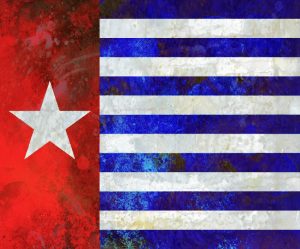The crisis involving a pilot taken hostage in Papua has taken a turn for the worse, with the rebel group holding the New Zealand national Philip Mehrtens claiming that it will shoot him if its demands are not fulfilled within two months.
In a video released on Friday, the West Papuan National Liberation Army (TPNPB), the armed wing of the Free Papua Movement, demanded that the Indonesian government begin independence talks within two months.
As described by Reuters, the video shows “a visibly emaciated Mehrtens holds the banned Morning Star flag, a symbol of West Papuan independence, and is surrounded by Papuan fighters brandishing what one analyst said were assault rifles manufactured in Indonesia.”
“If it does not happen within two months then they say they will shoot me,” Mehrtens says in the video, referring to his captors’ push for negotiations.
Papua has been home to a separatist insurgency since the region was absorbed by Indonesia after what independence activists say was a flawed U.N. referendum in 1969. But the conflict has worsened considerably since 2018, as the Indonesian state has extended infrastructure and transport links into the heart of highland Papua. This has inflamed resistance, prompting more sophisticated and successful attacks by TPNPB and other pro-independence groups.
Mehrtens, a pilot for the Indonesian aviation company Susi Air, was abducted by independence fighters in February, shortly after his single-engine plane touched down at an airstrip in the remote district of Nduga, in the Papuan highlands. Accusing New Zealand of providing support to Indonesia’s security forces, the TPNPB subsequently announced that Mehrtens would not be released until the Indonesian government acknowledged Papua’s independence. The abduction is just the second that the TPNPB has committed, the first of which occurred in 1996.
In comments given to CNN, a spokesperson from New Zealand’s foreign ministry said they were aware of the video and that the pilot’s welfare was its “top priority” and that the government was “doing everything we can to secure a peaceful resolution and Mr Mehrtens’ safe release.”
For its part, the Indonesian government has promised to continue to secure Mehrtens through peaceful negotiations, but has also seemingly been attempting to locate him in Nduga, a remote and thickly forested region in the center of Papua. Last month, Indonesian soldiers came under fire from separatist rebels in Nduga while attempting to locate Mehrtens.
The latest video suggests that the TPNPB has diluted its demand for full independence. But even attempting to leverage Mehrtens’ release into formal negotiations over the region’s political future seems like an unrealistic goal, given Jakarta’s clear reluctance to cede anything that might loosen its hold over the resource-rich province.
As things stand, the hostage situation requires delicate handling that Jakarta has often been accused of lacking in its dealings with Papua, though pressure from the New Zealand government and its partners may force it to adopt a more nuanced approach to this crisis. Either way, the actions it takes in the coming months may well determine whether the situation is defused peacefully, or whether the TPNPB will follow through on its threat.

































